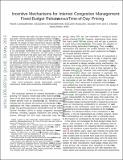Incentive Mechanisms for Internet Congestion Management: Fixed-Budget Rebate Versus Time-of-Day Pricing
Author(s)
Loiseau, Patrick; Schwartz, Galina; Musacchio, John; Amin, Saurabh; Sastry, S. Shankar
DownloadAmin_Incentive mechanisms.pdf (307.6Kb)
OPEN_ACCESS_POLICY
Open Access Policy
Creative Commons Attribution-Noncommercial-Share Alike
Terms of use
Metadata
Show full item recordAbstract
Mobile data traffic has been steadily rising in the past years. This has generated a significant interest in the deployment of incentive mechanisms to reduce peak-time congestion. Typically, the design of these mechanisms requires information about user demand and sensitivity to prices. Such information is naturally imperfect. In this paper, we propose a fixed-budget rebate mechanism that gives each user a reward proportional to his percentage contribution to the aggregate reduction in peak-time demand. For comparison, we also study a time-of-day pricing mechanism that gives each user a fixed reward per unit reduction of his peak-time demand. To evaluate the two mechanisms, we introduce a game-theoretic model that captures the public good nature of decongestion. For each mechanism, we demonstrate that the socially optimal level of decongestion is achievable for a specific choice of the mechanism's parameter. We then investigate how imperfect information about user demand affects the mechanisms' effectiveness. From our results, the fixed-budget rebate pricing is more robust when the users' sensitivity to congestion is “sufficiently” convex. This feature of the fixed-budget rebate mechanism is attractive for many situations of interest and is driven by its closed-loop property, i.e., the unit reward decreases as the peak-time demand decreases.
Date issued
2014-04Department
Massachusetts Institute of Technology. Department of Civil and Environmental EngineeringJournal
IEEE/ACM Transactions on Networking
Publisher
Institute of Electrical and Electronics Engineers (IEEE)
Citation
Loiseau, Patrick, Galina Schwartz, John Musacchio, Saurabh Amin, and S. Shankar Sastry. “Incentive Mechanisms for Internet Congestion Management: Fixed-Budget Rebate Versus Time-of-Day Pricing.” IEEE/ACM Transactions on Networking 22, no. 2 (April 2014): 647–661.
Version: Author's final manuscript
ISSN
1063-6692
1558-2566